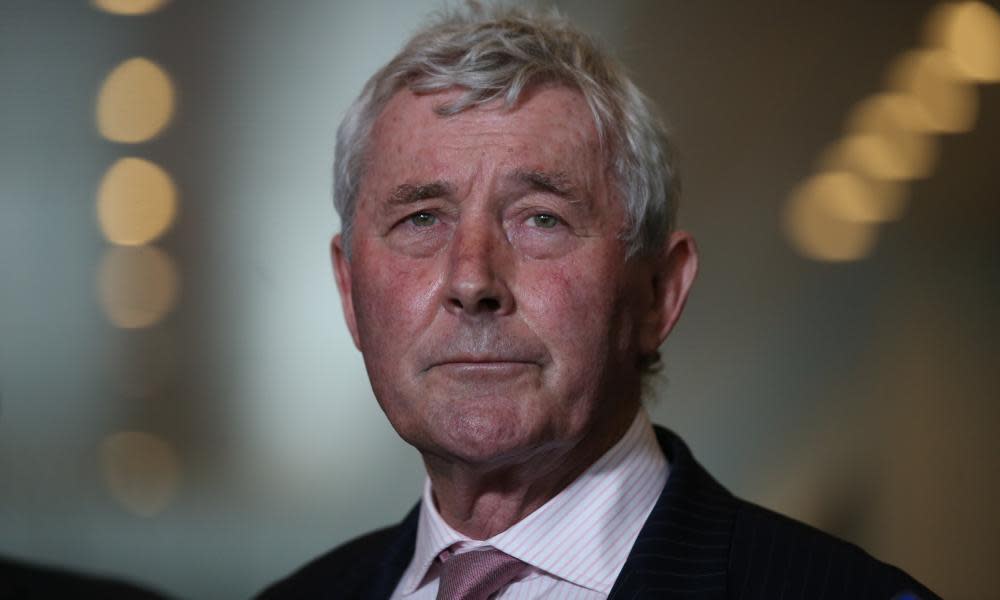Prosecution of whistleblower lawyer Bernard Collaery dropped after decision by attorney general

The attorney general, Mark Dreyfus, has dropped the prosecution against Witness K’s lawyer, Bernard Collaery, for allegedly revealing spying on Timor-Leste.
Dreyfus announced in Sydney on Thursday that the commonwealth had discontinued the case in which Collaery was charged with unlawfully disclosing information about an Australian Secret Intelligence Service mission to bug the government offices of Timor-Leste.
Collaery was set to be tried in October on five counts of leaking classified information for allegedly helping his client, an ex-spy known only as Witness K, reveal a mission to spy on Timor-Leste, an impoverished ally, during negotiations over oil and gas reserves in the Timor Sea in 2004.
Related: Coalition government spent $6m prosecuting Bernard Collaery and three other whistleblowers
On Thursday Collaery said the end of the prosecution was “a good decision for the administration of justice in Australia” that would allow him to “move forward with [his] life and legal practice”.
He thanked his lawyers Gilbert and Tobin and barristers, who worked pro bono on the case.
“I want to thank all of the people across Australia who have supported me and worked so hard to assist me throughout this case. I am in awe of the depth of support in our community for ethical values.”
Since Labor’s election in May, the new government has come under renewed pressure from crossbench parliamentarians to drop the case. Dreyfus said he would consider this an urgent priority, throwing the case into significant doubt due to his comments in opposition that the charges were an “affront to the rule of law”.
On Thursday Dreyfus announced he had “determined this prosecution should end” and that he had exercised his power in the Judiciary Act to discontinue it.
“In taking this decision I have had careful regard to our national security, our national interest and the proper administration of justice,” Dreyfus said in a statement.
“This decision to discontinue the prosecution was informed by the government’s commitment to protecting Australia’s national interest, including our national security and Australia’s relationships with our close neighbours.”
The attorney general had notified the ACT supreme court, the commonwealth director of public prosecutions and Collaery’s legal representatives.
Witness K had pleaded guilty to breaching secrecy laws resulting in a three-month suspended prison sentence in June 2020. Collaery fought the charges, in a long-running and expensive legal dispute.
The case had languished in the courts of the Australian Capital Territory, beset by repeated delays and interventions from the commonwealth attorney general, who had imposed secrecy on the proceedings using the National Security Information Act.
The cases against Collaery and Witness K were launched shortly after Christian Porter became attorney general in December 2017, after he gave consent for the prosecutions which had not been forthcoming from his predecessor George Brandis.
Brandis told Guardian Australia that his decision not to approve the prosecutions and certify they were in the public interest was “based on various advice I’d received, that I’m not at liberty to go into”.
Email: sign up for our daily morning briefing newsletter
App: download the free app and never miss the biggest stories, or get our weekend edition for a curated selection of the week's best stories
Social: follow us on YouTube, Facebook, Instagram, Twitter or TikTok
Podcast: listen to our daily episodes on Apple Podcasts, Spotify or search "Full Story" in your favourite app
“Ultimately that was my judgment, but I don’t wish to criticise Mr Porter [for consenting],” Brandis said in an interview in late June.
Porter said in 2018: “the commonwealth director of public prosecutions considered the brief of evidence and subsequently made an independent decision that a prosecution was the appropriate course of action.”
“Accordingly the director sought my consent to that decision to prosecute, which consent I provided.”
In 2019, Porter explained that he had been advised the “evidence meant that there was a reasonable prospect of conviction and a public interest [in] proceeding”.
Centre Alliance MP, Rebekha Sharkie, welcomed Dreyfus’ decision.
“At no point during this wretched affair has there been a clear and persuasive argument for why pursuing this case is in the public interest.”
Independent MP, Andrew Wilkie, said “the Australian government is the real villain in this case, having made the appalling decision to spy on East Timor which is one of the poorest countries in south-east Asia”.
Dreyfus had also been asked to similarly drop prosecutions against the Afghanistan war whistleblower David McBride and the taxation office whistleblower Richard Boyle.
Last week the former senator Rex Patrick said he was “deeply disappointed” that Dreyfus had not opted to use his power to discontinue proceedings against Boyle.
I’m deeply disappointed @markdreyfusQCMP has refused to exercise his public interest power to stop the prosecution of ATO whistleblower and hero, Richard Boyle. No-one in the public service will blow the whistle on illegal or improper conduct knowing persecution follows. #auspol pic.twitter.com/PTKDrY742y
— Rex Patrick (@MrRexPatrick) June 30, 2022
“The attorney general’s power to discontinue proceedings is reserved for very unusual and exceptional circumstances,” Dreyfus wrote to Patrick.

 Yahoo Movies
Yahoo Movies 
